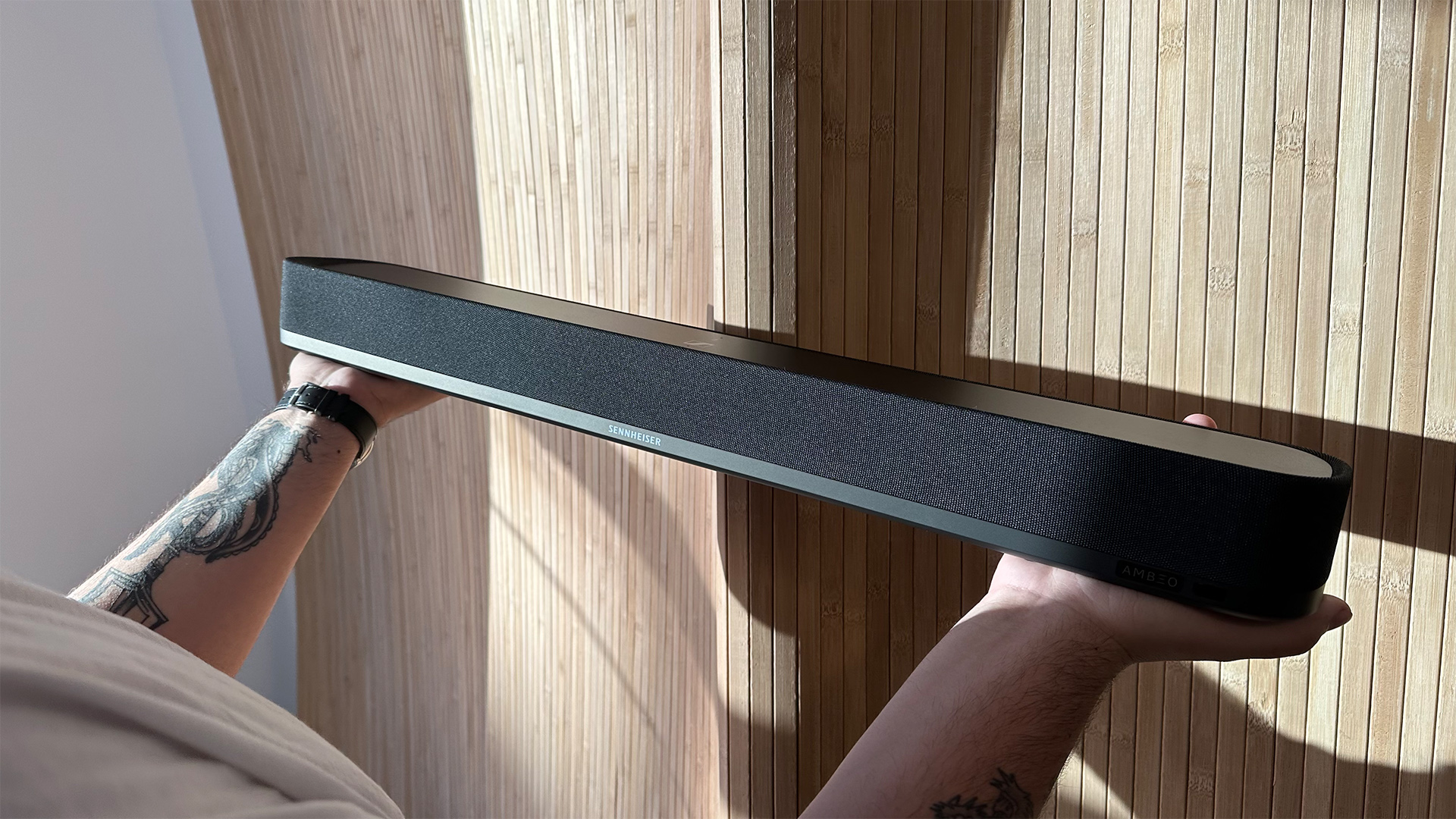What Hi-Fi? Verdict
Sennheiser’s Ambeo range has set high expectations, but the Mini fails to meet them
Pros
- +
Clear and clean sound overall
- +
Premium build and aesthetic
- +
Comprehensive app
Cons
- -
Expensive compared to peers
- -
Thin and uninspired sound
- -
Lacks low-end authority
Why you can trust What Hi-Fi?
Sennheiser’s Ambeo lineup has been a benchmark of premium soundbars ever since it launched in 2019. The Soundbar Max, its original super-sized soundbar, has sat steadfastly on our yearly Awards list as the best premium option since then, while the Soundbar Plus model, launched last year, was a stellar five-star soundbar that posed a genuine threat to the excellent Sony HT-A7000.
So, you can imagine our excitement when a new, compact Sennheiser Ambeo was first rumoured and subsequently confirmed. Unfortunately, now that we have the Ambeo Mini in our testing room, that excitement has faded.
Price
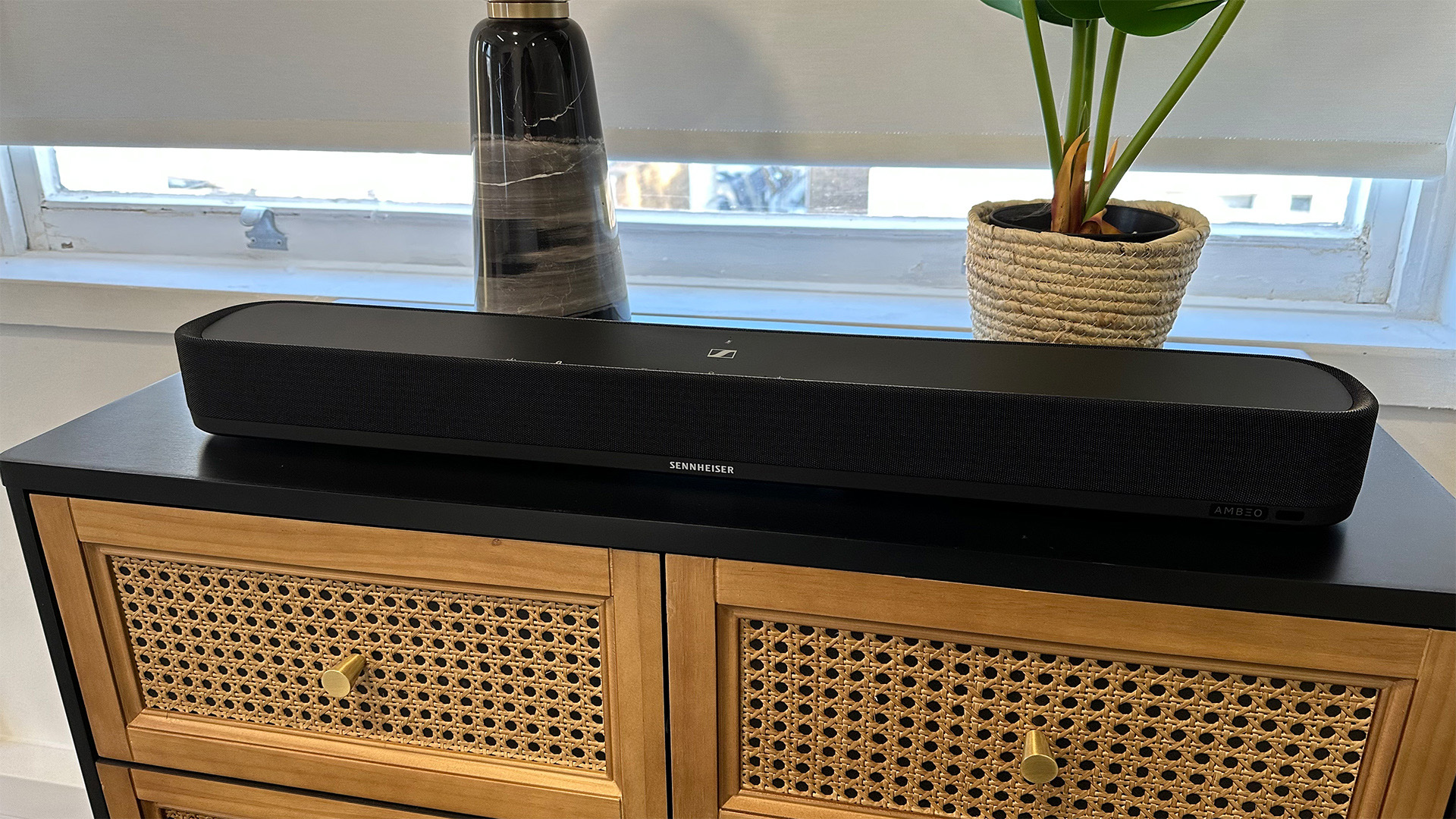
Considering that its sibling soundbars cost much more, with the Ambeo Soundbar Plus priced at £1299 / $1499 / AU$2400 and the Soundbar Max retailing for £2199 / $2500 / AU$4000, this new Mini variant might sound like a steal. But when we look at the wider soundbar market, it faces tough competition.
The Ambeo Mini sits in an awkward position between two Award-winning Sonos Dolby Atmos soundbars. The Arc, Sonos’ full-fat Dolby Atmos soundbar normally retails for £899 / $899 / AU$1499 (after its price rise in 2021), although it’s frequently discounted to around the £700 mark. The other Sonos competitor, the Beam Gen 2, costs much less than the Ambeo Mini at £449 / $449 / AU$649, but it resembles the Sennheiser much more closely in design, size and specification.
Getting back to Sennheiser, the Ambeo Mini is compatible with the Ambeo Sub, an optional subwoofer that you can buy for £599 / $700 / AU$1120. The Mini can actually be connected to up to four Ambeo Subs if you so desire (and have the budget to do so).
Build
The Ambeo Mini’s design is one of the few things that Sennheiser gets seriously right. In stature, it’s roughly the same length as a supermarket baguette. However, compared to the Sonos Beam, the Ambeo is a much more style-conscious soundbar, with its sharp angled lines and monochromatic matte black and mesh exterior – though it's worth noting that this soundbar is only available in black.
You’ll notice that the top of the soundbar is entirely covered in a matte plastic panel, with no speaker grilles to be found. This is because the Mini doesn’t have any dedicated upward-firing drivers – more on this later. Instead, you’ll find a small LED light bar for volume and other status indicators, as well as capacitive touch buttons for everything from volume to source input and muting the four on-board microphones.
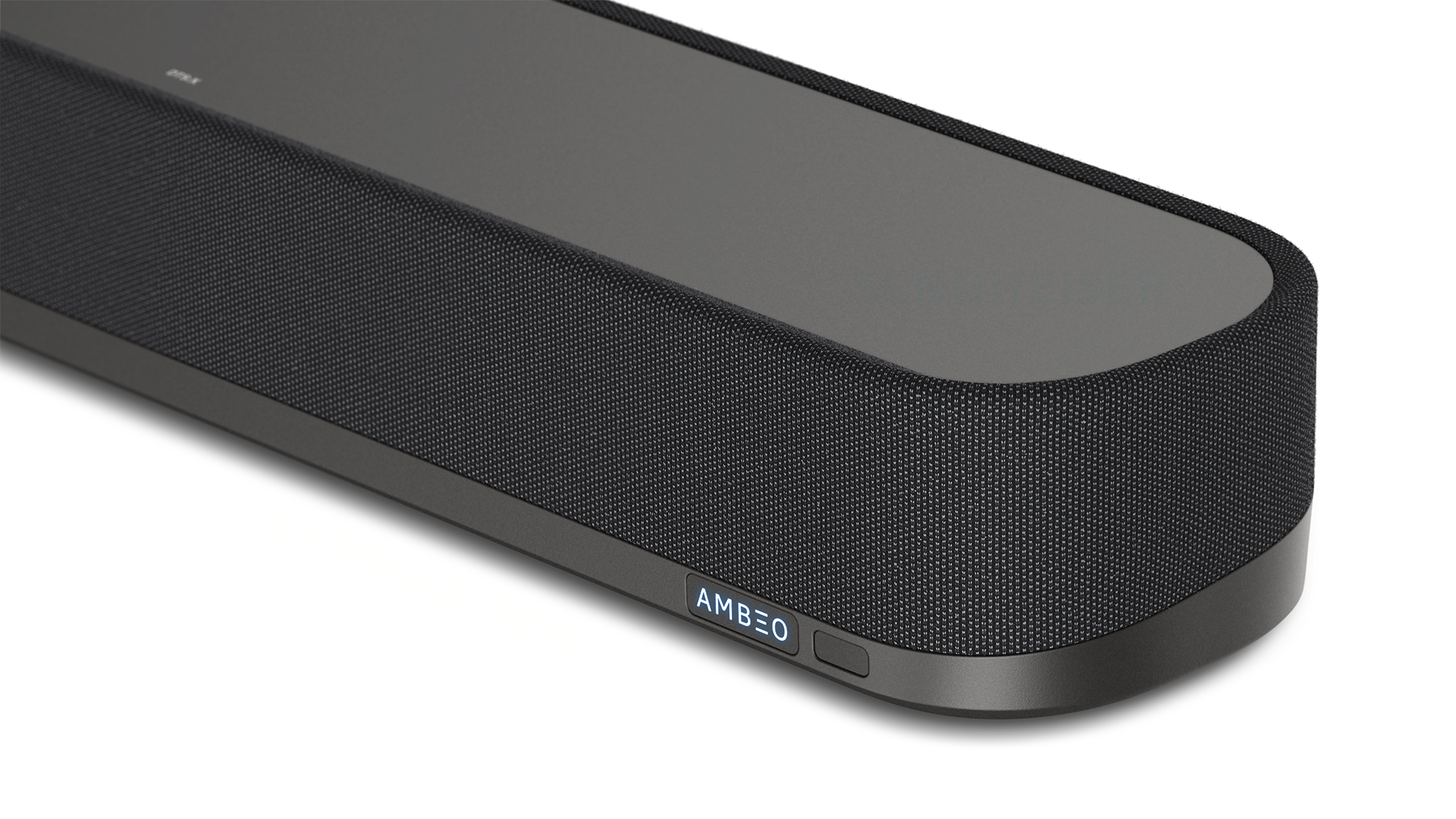
Connectivity HDMI out (eARC), USB, wi-fi, Bluetooth
Sound format support Dolby Atmos, DTS:X, MPEG-H, Sony 360 Reality Audio
Streaming Spotify Connect, Apple AirPlay 2, Tidal Connect
Voice control Alexa
Dimensions (hwd) 6cm x 67cm x 11cm
On the rear of the bar, you’ll find three connections: a power input, a single HDMI eARC connection and a USB port. While the lack of any HDMI passthrough is somewhat forgivable as it is a compact soundbar and its Sonos competitors are also lacking in this regard, the placement of these ports is less forgivable. The power connector and HDMI socket are unfortunately far too close together, and the included right-angle power cable awkwardly blocks the HDMI socket when you plug it in the seemingly correct way. While this can be rectified by switching the connector the other way around, it doesn’t seem like the intended way to plug it in as the fit between the chassis of the soundbar and the cable is uncomfortably tight.
Overall, the Ambeo Mini feels solid and appropriately high quality to the touch and its design is a lot more interesting than the Sonos which, while nicely built, seems a bit boring in comparison.
Features
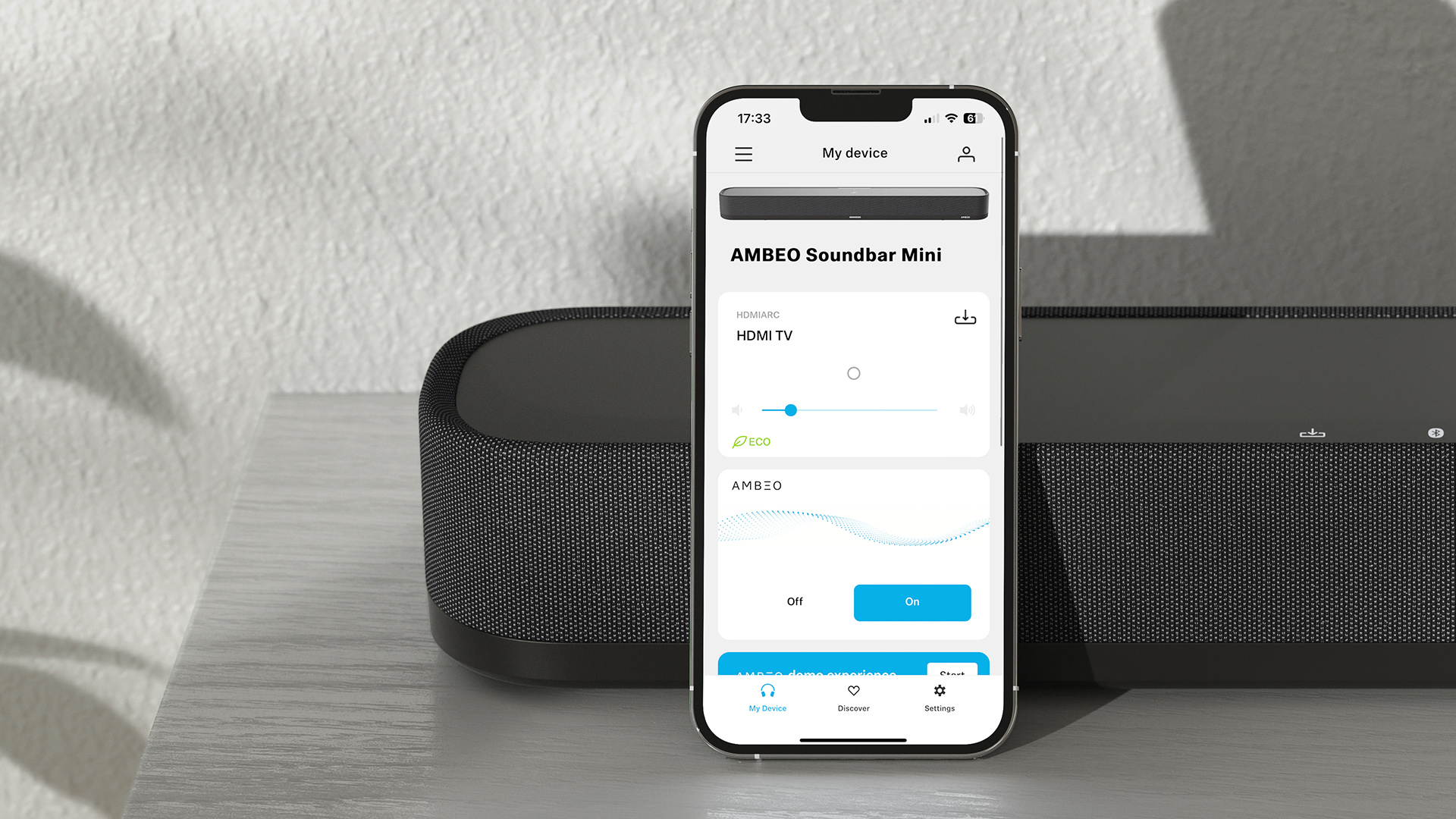
Let's start with the headlining feature of the Ambeo Mini, Dolby Atmos support. This is delivered via the higher-quality Dolby True HD format thanks to the HDMI eARC connector. The Mini also supports DTS:X, MPEG-H and Sony 360 Reality Audio immersive audio codecs.
But, as we’ve previously mentioned, there are no upward-firing drivers on this unit, so how does it achieve that trademark overhead sound that Atmos is best known for? Sennheiser has taken the “phantom speaker” route which uses clever digital processing to deliver immersive sound around the listener.
Setting this up is very easy thanks to the comprehensive Sennheiser Control App, which includes an automatic calibration process using the onboard microphones. From here the soundbar will determine the dimensions of your room and best adjust the sound to suit it, as well as locate where the phantom speaker sound should come from.
Speaking of the app, it's arguably a better way to interact with the bar than the included remote. It has plenty of customisable settings, an easy way to switch between the included sound modes (adaptive, music, movie, sports and news), enable voice enhancement mode, a neighbour-friendly night mode, and a way to quickly switch the Ambeo sound setting on and off.
Speaking of which, the namesake of this soundbar refers to Sennheiser’s sound processing system, which sets out to further enhance the three-dimensional effect of the sound. While we’ll save a full breakdown for the sound section of this review, we do quite like the effect it creates. It’s worth noting that the Ambeo system works alongside Dolby Atmos to enhance the 3D aspect of the immersive audio.
We’ve already mentioned the Ambeo Mini's ports, but we do want to circle back to the lack of HDMI passthrough. While we accept that the smaller frame of the Ambeo Mini means that sacrifices have to be made, we can’t help but feel like an additional port could have been squeezed in to make up for the HDMI 2.1 you’ll be sacrificing on your TV; as we know these are precious commodities, and some TVs still only support two connectors. Thankfully, wireless connectivity is stellar and makes up for some wired connectivity shortcomings. Here you can stream to the bar over wi-fi, Bluetooth and Apple AirPlay 2, as well as link streaming services such as Spotify Connect and Tidal Connect. Sennheiser’s app also has its own media player controls built in, meaning you can stream to and control the soundbar from one convenient place.
Finishing things off with the Ambeo Mini’s driver configuration, Sennheiser has equipped it with six drivers in total. This includes four full-range drivers and two subwoofer units; all of this is powered by 250 watts of class D amplification.
Sound
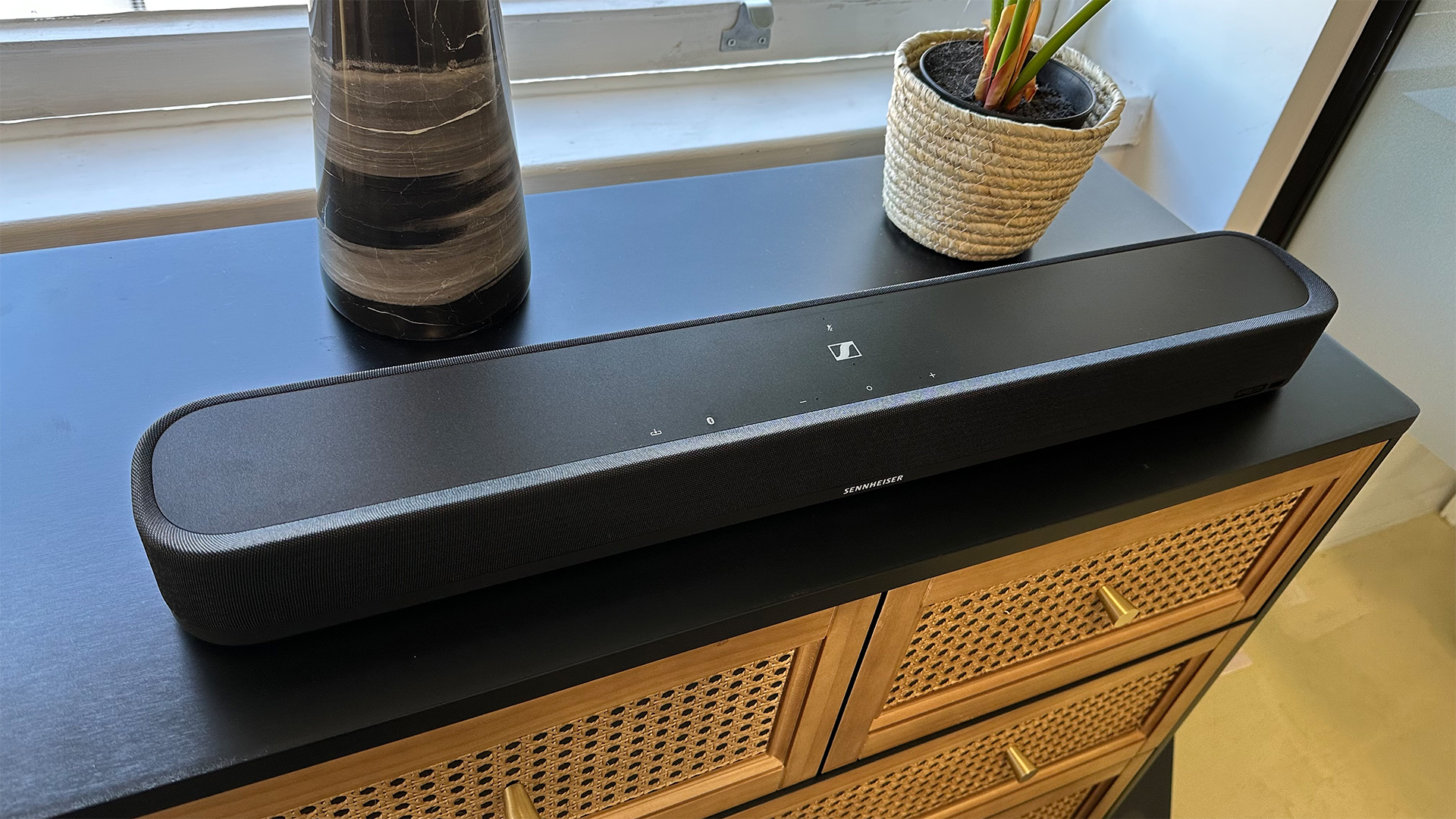
The make-or-break aspect of any soundbar, or any home cinema speaker for that matter, is how it sounds. Unfortunately, it's not good news for Sennheiser who, after two excellent previous outings, has dropped the ball with the Mini.
Let's start with the positives; the Ambeo Soundbar Mini is by no means offensive-sounding. In fact, it produces a clear sound with plenty of detail, meaning it gets the basics right. Firing up The Batman’s epic Batmobile chase, we do see a few upsides to the Ambeo’s sound. As The Penguin rains bullets down onto a car that he suspects Catwoman to be hiding behind, there is a pleasing metallic sparkle as the bullets make contact with the car. In this instance, speech is perfectly audible over the growling Batmobile and constant gunfire.
However, this is where the Ambeo takes a turn, as we’re immediately struck by its woefully narrow soundstage. We can practically point to where the sound seems to end, and it's mere centimetres away from the bar itself. Projection is also poor, especially for a Dolby Atmos soundbar, as it struggles with pushing sound out into the room. Despite its own claims, we hesitate to call the Ambeo Mini immersive or particularly three-dimensional.
In the more hectic moments of this car chase, we realise that there’s also a lack of spatial separation between the various sound effects. As dialogue, the screeching of car tyres, the grumble of engines and the soundtrack all compete for our attention, we are presented with a mushy, ill-defined sound that becomes increasingly frustrating to listen to.
Most unforgivable, however, is the Ambeo Mini’s lack of dynamics. The usually goosebump-inducing score of The Batman lacks punch and dynamism, diminishing the drama and suspense of this usually gripping scene. We’d be remiss not to mention that we tested the soundbar with both the Ambeo mode switched on and off, and the verdict is that the processing allows for much greater scale and the preferable option is to leave it switched on, as it sounds much flatter and even less engaging switched off.
Switching over to the opening scene of Unbroken, there are a few glimmers of hope for the Ambeo. For example, we note that it can go fairly loud without distorting or sacrificing clarity. This helps to somewhat improve the presence of the soundbar and, although it doesn’t make the sound more dynamic by any means, it does give a semblance of cinematic quality to the sound. A good level of clarity through the midrange is another positive point, which allows for some mid-level sound effects and dialogue to be presented with adequate detail.
Things, unfortunately, don’t get much better from there, however. As the bomber approaches the screen, there is a building rumble that lulls us into a sense that the Ambeo might have hit its stride, although this quickly diminishes when we realise that this fails to build to anything greater. As the plane swoops across the screen, we also get a hint that the Ambeo tries to create some directionality to the sound, something that crops up a few times in this scene and that we enjoy when the soundbar can muster the strength to do so.
As for the rest of this scene, it's not particularly good news either. Overall, the Ambeo just feels like it's not trying, with its narrow, flat and muddy sound simply providing little to engage with. Voices are once again clear, but they all sound very monotone and lack any warmth or character, which can be heard on other soundbars, so this is not for the actors’ lack of trying by any means.
Low-end frequencies are also not particularly good, with the flak cannon explosions lacking any weight or punch. In particular, a bass note that punctuates the beginning of the scene is absent on the Ambeo, while it's noticeable on the Sonos Beam Gen 2.
And this is where we have to acknowledge the elephant in the room, the existence of its Sonos competitors. While the Arc is closer in price, and outperforms the Ambeo in most regards, it's the Beam that truly contextualises the Ambeo Mini’s performance. Considering it’s much cheaper than the Sennheiser and similar in form factor and specification, the Beam Gen 2 outperforms the Ambeo in all of our tests. Providing a richer, warmer and more engaging sound overall, the Beam is also noticeably more Atmos-y, with greater attention given to the spatiality of the sound and more evident overhead effects.
This extends to musical performance, as despite Sennheiser claiming this to be a soundbar that’s equally focused on musical performance as it is for movies and TV, the Sonos is the better buy. Firing up boygenius’ Bite The Hand, we don’t get the intended emotion from the trio’s vocals. Everything from the plucky guitars to the harmonising vocals sounds unengaging and flat, and that’s with Ambeo mode switched on; switching it off results in an even duller presentation. The track isn’t what we’d call upbeat, but it has a certain energy that the soundbar can’t deliver due to its overall lack of rhythmic drive.
Verdict
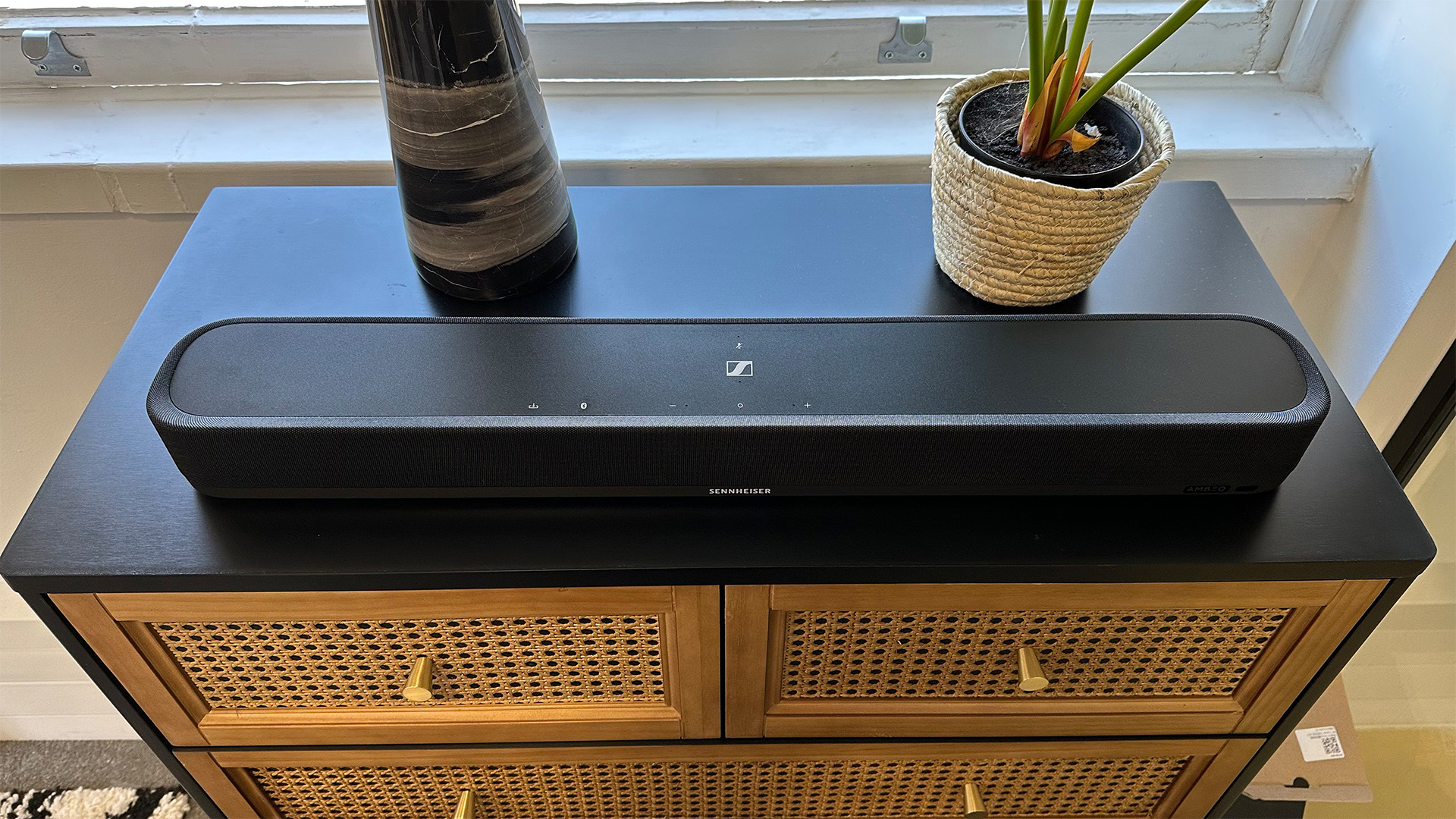
Sennheiser, we’re not angry, we’re just disappointed. We know from experience that Ambeo soundbars are usually better than this, but with the Ambeo Soundbar Mini, it's clear that the German audio brand has bitten off more than it can chew.
Despite a promising start with its solid build and feature set, it's sound that is paramount here – and unfortunately, you can get a much better-sounding compact Dolby Atmos soundbar for a lot less money.
SCORES
- Sound 3
- Build 4
- Features 4
MORE:
Read our review of the Sonos Beam Gen 2
Also consider the Sonos Arc
Read our Sony HT-A5000 review
Best soundbars: Top options for every budget
What Hi-Fi?, founded in 1976, is the world's leading independent guide to buying and owning hi-fi and home entertainment products. Our comprehensive tests help you buy the very best for your money, with our advice sections giving you step-by-step information on how to get even more from your music and movies. Everything is tested by our dedicated team of in-house reviewers in our custom-built test rooms in London, Reading and Bath. Our coveted five-star rating and Awards are recognised all over the world as the ultimate seal of approval, so you can buy with absolute confidence.
